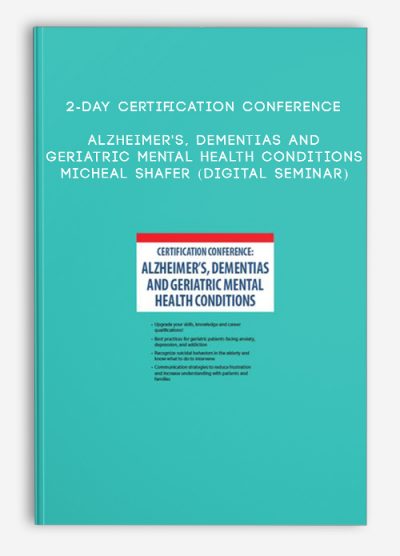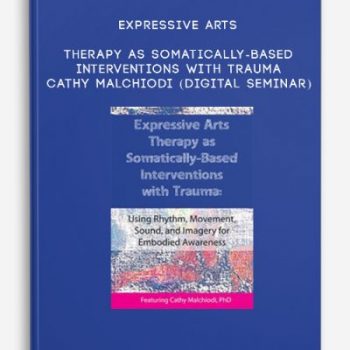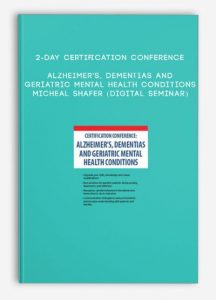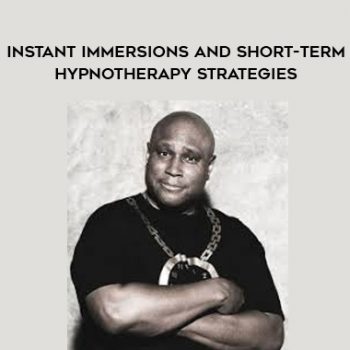2-Day Certification Conference: Alzheimer’s, Dementias and Geriatric Mental Health Conditions – MICHEAL SHAFER (Digital Seminar)
Description:
No matter the discipline, very few providers have received adequate training on safely and effectively meeting the complex mental and behavioral health needs of older adults.
Don’t be caught unprepared!
Whether you’re a social worker, psychologist, counselor, nurse, OT, PT, SLP, or Long-Term Care professional.
This training is exactly what you need to ensure proper care for geriatric patients facing Alzheimer’s, other dementias, depression, anxiety, trauma, substance use issues, and suicidal ideation.
More than a broad overview, this training will give you specific strategies and interventions tailored to older adults.
During this specialized training you’ll receive:
- Cognitive assessment tools and interpretation tips
- Practical solutions to challenging behaviors in dementia patients
- Detailed guidance on recognizing the warning signs of suicidal behavior in older adults
- Adaptive solutions to treat late life depression, anxiety, trauma and drug use
- Tips and tactics for successfully working with families
Purchase today and leave feeling prepared and confident in your ability to overcome the most challenging complexities of working with geriatric patients as a Certified Dementia Care Specialist (CDCS)!
Outline:
DAY 1
Dementia Differentiation, Diagnosis and Prognosis
- Types of dementia and how to differentiate between them
- Pseudo-dementia explanations
- Mild Neuro-Cognitive Disorder
- Diagnosis, prognosis, and stages
- The latest preventative treatments
Cognitive Assessment Essentials
- Mini-Mental State Examination
- SLUMS
- Administration and scoring
- Objective and subjective interpretation
Challenging Behavior Toolbox:
Trigger Identification, Problem Solving, and Compassionate Intervention Strategies
- Individualizing care – strengths and limitations
- Pain and pain assessment
- Tactics for verbal and physical combativeness
- Agitation – triggers, pain and care planning
- Delusions and hallucinations — potential causes and complications
- Wandering – redirection techniques to reduce risks
- Tips for working with sundowners
- Sexual expressiveness and interventions for dignity
- Activities of Daily Living – structure and engagement strategies
Verbal and Non-Verbal Strategies for Communication:
Reduce Frustration and Increase Understanding with Dementia Patients
- When traditional communication is replaced by behaviors
- Person centered: Gathering beliefs and values
- Effective tips for communicating with dementia patients
- Find the meaning behind the gesture
- How to avoid arguments
- What questions to ask, and how to ask them
- Meaningful activities that connect
Tips and Tactics for Successfully Working with Caregivers
- Family dynamics
- Validation, empathy and active listening
- Caregiver burnout and where to go for help
- End of life issues
- Ethical issues and abuse
DAY 2
How Aging Impacts Mental Health
- The aging brain, body and unique stressors of late life
- Social systems, stigma and life role transitions
- How medical illness impacts mental health
Geriatric Pharmacology:
Essential Considerations for Safety and Effectiveness
- The senior metabolism and unique safety concerns
- Common side effect of drugs on seniors
- Interactive effects to be aware of
Late-Life Depression:
Assessment and Interventions
- Assessment strategies for late-life depression
- The role of social support
- Working with grief and loss
- Cognitive approaches to focus on today’s problems
- Adaptive exercise solutions for the physically challenged
Suicide in Older Adults:
How to Recognize the Warning Signs and Properly Intervene
- The complexity of suicidal behavior in older adults
- Assessment and screening tools
- Treatment approaches and crisis guidance
Alcohol and Drug Use in the Elderly
- Unique vulnerabilities and diagnostic difficulties
- Assessment instruments
- Motivational Interviewing and relapse prevention strategies
Late-Life Anxiety:
Identification and Treatment Strategies Adapted to Older Adults
- Risk factors, stressors and symptoms
- Loss of social support and fear of being alone
- Medical issues and hypochondria
- Evidence-based psychological treatments
Trauma-Informed Treatment of Older Adults
- What the latest research tells us – and what it doesn’t
- Special considerations when assessing seniors for trauma
- Trauma and somatic complaints
The Role of Nutrition in Geriatric Behavioral Problems
- How vitamin and mineral deficiencies impact behavior
- How the volatility of blood sugar can impact behavior
- Strategies for non-compliant eating
NLP online course
So what is NLP?
Firstly, NLP stands for Neuro-Linguistic Programming. Secondly neuro refers to your neurology;
Thirdly linguistic refers to language however, programming refers to how that neural language functions.
As a result,In other words, learning NLP is like learning the language of your own mind!
Moreover, NLP is the study of excellent communication–both with yourself, and with others.
It was developed by modeling excellent communicators and therapists who got results with their clients.
NLP is a set of tools and techniques, but it is so much more than that.
In conclusion, It is an attitude and a methodology of knowing how to achieve your goals and get results.
Preview Information:
Original Page
Archive Page














Lord –
This is Digital Download service, the course is available at Vincourse.com and Email download delivery.